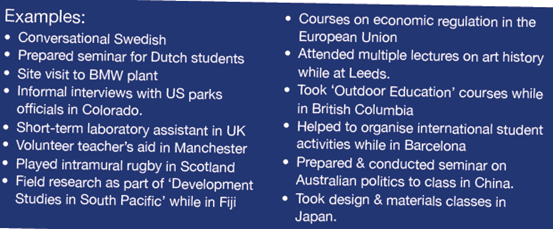Reflection Process
"Experience without reflection is like eating without digestion"
BLTH Project
In the Preparing or Being there modules you may have considered your bucket list for your international experience in terms of:
Once you are back home, it can be useful to build an inventory or portfolio of specific experiences that you can reflect on in the context of employability skills that are important to employers. For example:
| Tapping into your memories |
Reflect back on your experiences and see if you can sort them into these life experience categories: |
If you created a portfolio during your international take the time to reflect on the images, notes or posts you collected during your study and unpack them. If you didn’t maintain a portfolio while you were abroad, use the categories in the Reflecting on my experiences form here in either Ms Word or Adobe.PDF format, to help you tap into your memory and identify useful experiences.
As you reflect on your experiences, write using outcome-focussed language rather than descriptive. For example:
Cultural Experience: Living in Colombia meant I had to learn the language
The unpacked outcome: I’m fluent in conversational Spanish
Need help to get started?
If you’re not sure where to start, here are some experiences that previous students have identified.

As you read through the list, consider the categories you might put them into if they were your experiences. Here are a few of the experiences as classified by others:
| Employability Skills Worksheet |
Think about the top eight employability skills identified by employers. |
You might consider what you learned about working with other sorts of people that you might be able to generalise to work situations. For example:
Communication, teamwork and problem-solving are key employability skills that you can develop through a range of experiences even if they aren’t specifically work-related. For example, you could develop:
I had employment-related experience, where do I start? (Case study) |
If you’re not sure where to start, here is an example of how one student used her experience as a volunteer employee to address some of the criteria on the Employability Skills Worksheet. Lauren’s Employment Experience: The careers advisor asked Lauren to reflect on her specific experiences as a teacher’s aid and share two or three significant aspects of her work. They worked together to re-tell those key aspects as specific employability skills. Here was what Lauren included in her Employability Skills worksheet as a starting point. Communication Skills: Self-Management Skills: |
I had no employment-related experience, where do I start? (Case study) |
If you’re not sure where to start, here is an example recreated by Alexandra Haaxman, careers advisor, Murdoch University. The experience has been unpacked so it could be added to the Employability Skills Worksheet. The un-PACK model provides you with a good framework for working through this process. How Marco used the un-PACK model to build his career story: Understand the: Problem or Opportunity
Clear outcomes: Knowledge and skills acquired: Communication: |
Open the Employability Skills Worksheet here in either Ms Word or Adobe.PDF format, and reflect on your experiences abroad. Type in evidence of employability skills that you gained from your overseas experience. You may not have a suitable example for every skill listed. That’s okay. The first step is to simply unpack your international experience so that you can turn it into information that will appeal to employers.
Print and save your worksheet for future reference.
Think about all of your experiences in the context of employability skills. Just because you didn’t have a specific ‘employment’ experience you can use cultural, personal and academic experiences to demonstrate employability skills. Remember soft skills are the most transferable skills.

